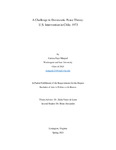| dc.rights.license | In Copyright | en_US |
| dc.creator | Margraf, Carissa Faye | |
| dc.date.accessioned | 2021-05-14T12:48:37Z | |
| dc.date.available | 2021-05-14T12:48:37Z | |
| dc.date.created | 2021 | |
| dc.identifier | WLURG38_Margraf_POL_2021 | |
| dc.identifier.uri | http://hdl.handle.net/11021/35212 | |
| dc.description | Thesis; [FULL-TEXT FREELY AVAILABLE ONLINE] | en_US |
| dc.description | Carissa Faye Margraf is a member of the Class of 2021 of Washington and Lee University. | en_US |
| dc.description.abstract | This project examines covert action against Chilean President Salvador Allende during the 1970s and the interruption of democratic practices in the nation following United States interference. Through the efforts of the Central Intelligence Agency (CIA) under the authorization of President Nixon and National Security Advisor Henry Kissinger, the United States sought to impact a foreign election and later support a forceful change of power. In doing so, the United States had a hand in the perpetuation of violence and anti-democratic institutions in Chile throughout the 1970s and 80s in the interest of preventing a leftist democratic government from wielding power during the Cold War. In its devotion to the containment of Soviet power and communist ideology in Latin America, the United States intervened in a democratic nation and hence forsook one of its guiding principles: the promotion of democracy.
This study seeks to analyze how the United States has been able to justify its involvement in overthrowing Chilean democracy. Furthermore, this study examines the subsequent consequences of these actions in addition to the precedents established by the United States concerning foreign relations and democracy in Latin America. By examining the justifications and mechanisms of intervention utilized against the democratically elected government of Chile during the Cold War, this study challenges the notion that the United States consistently pursues policies that align with the goal of democratic promotion, and furthermore asserts that the United States has behaved contrary to the principles of Democratic Peace Theory. These questions will be addressed through examinations of declassified government communications and the rhetoric projected by United States leaders to gain support for the doctrine of containment of communism through any means necessary. | en_US |
| dc.format.extent | 90 pages | en_US |
| dc.language.iso | en_US | en_US |
| dc.rights | This material is made available for use in research, teaching, and private study, pursuant to U.S. Copyright law. The user assumes full responsibility for any use of the materials, including but not limited to, infringement of copyright and publication rights of reproduced materials. Any materials used should be fully credited with the source. | en_US |
| dc.rights.uri | http://rightsstatements.org/vocab/InC/1.0/ | en_US |
| dc.subject.other | Washington and Lee University -- Honors in Politics | en_US |
| dc.title | A Challenge to Democratic Peace Theory: U.S. Intervention in Chile, 1973 (thesis) | en_US |
| dc.type | Text | en_US |
| dcterms.isPartOf | RG38 - Student Papers | |
| dc.rights.holder | Margraf, Carissa Faye | |
| dc.subject.fast | Allende Gossens, Salvador, 1908-1973 | en_US |
| dc.subject.fast | International relations | en_US |
| dc.subject.fast | Chile | en_US |
| dc.subject.fast | Sovereignty, Violation of | en_US |
| dc.subject.fast | Chile | en_US |
| local.department | Politics | en_US |
| local.scholarshiptype | Honors Thesis | en_US |
